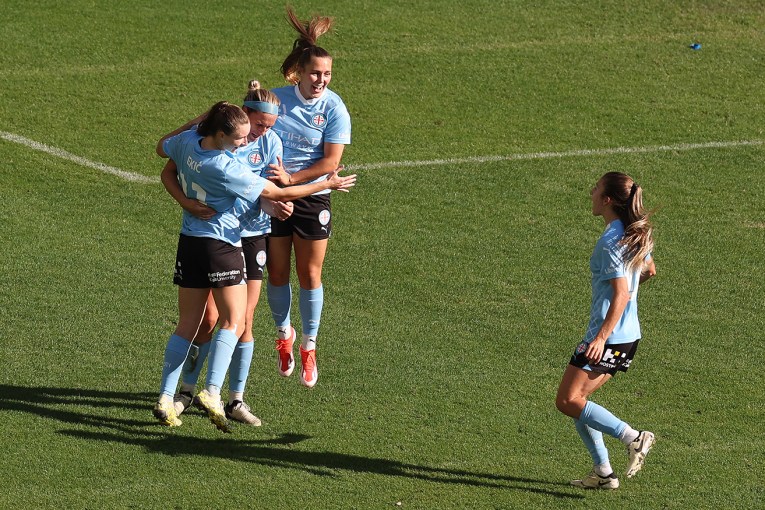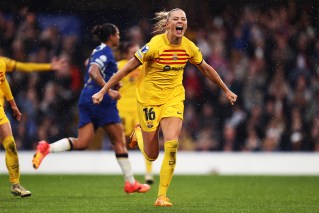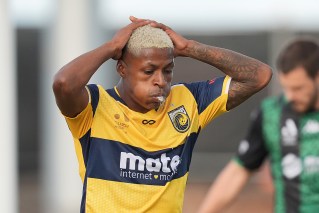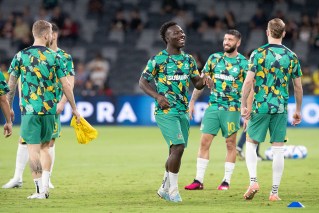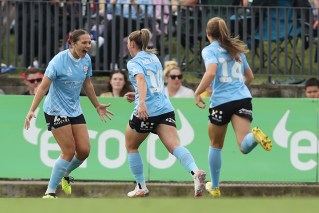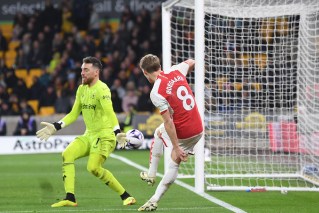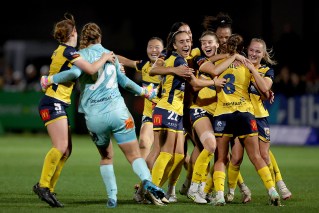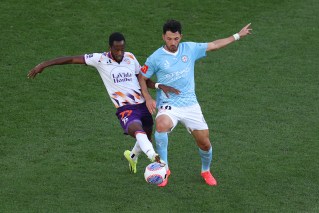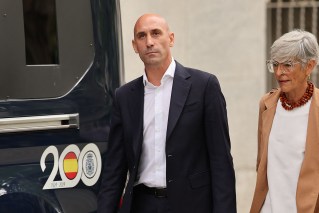What inspires Victory’s record-setting W-League coach
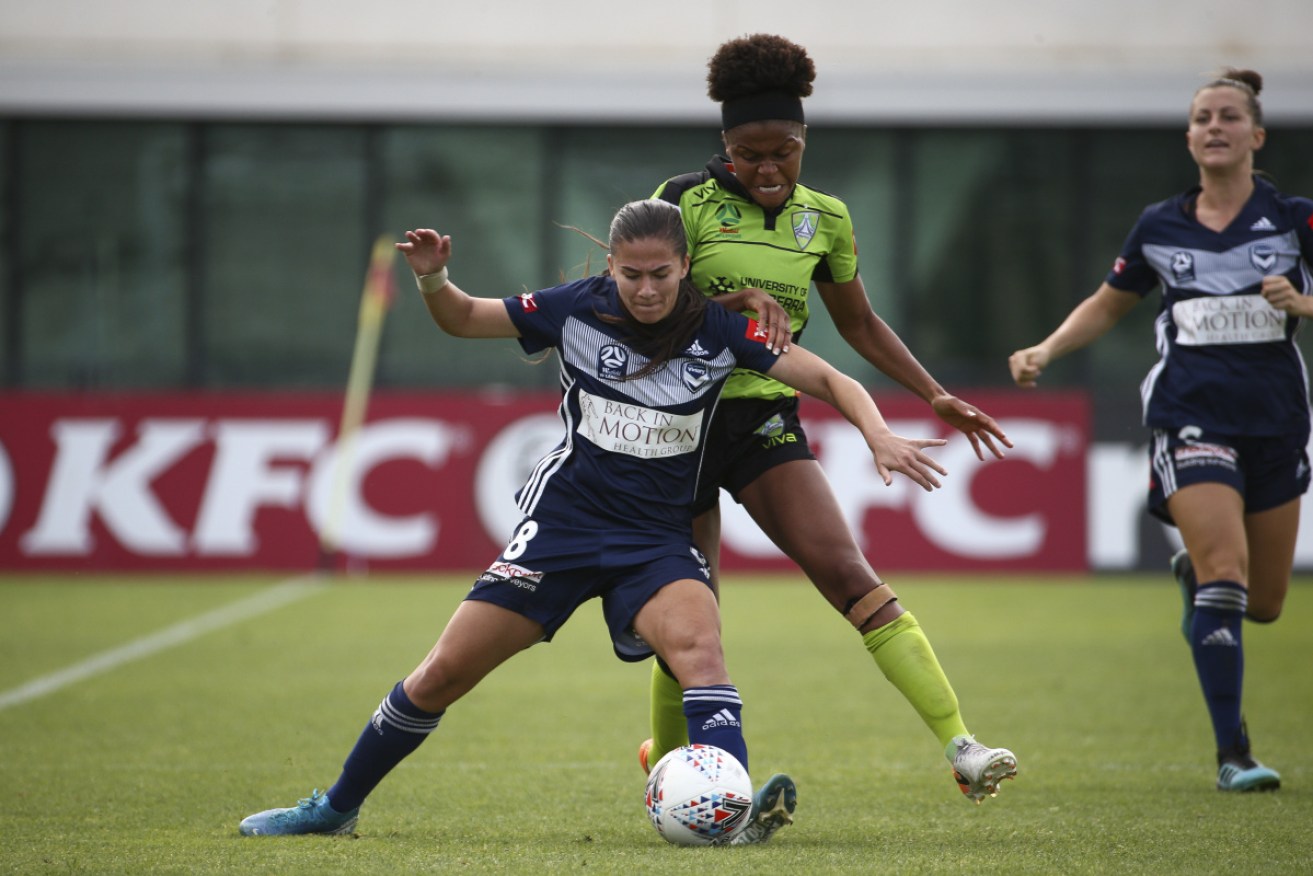
Victory's Angela Beard competes with Canberra United's Simone Charley during their Round 11 W-League clash. Photo: Getty
History was made at Lakeside Stadium on Sunday but, unless you’re an ardent follower of women’s football in Australia, it probably didn’t come across your radar.
With a 3-0 win over Canberra United, Melbourne Victory head coach Jeff Hopkins secured sole possession of first place on the all-time wins list for W-League coaches – standing alone at 49.
“It was a surprise to me,” Hopkins told The New Daily.
“They kind of dropped it on me at halftime of the game; that was the first I’d heard it.”
https://twitter.com/victorywleague/status/1221336834615037952
Born in Swansea, Hopkins in his playing days was a tough-as-nails central defender; earning 16 caps for Wales and playing 219 games for Fulham, 70 for Crystal Palace and 131 for Reading across 16 seasons in England.
He arrived in Australia in 1999, brought out to NSL side Gippsland Falcons by fellow Brit Stuart Munro.
Following Munro’s departure for Carlton in 2000, he took the reins of the Falcons until the club’s dissolution.
A friendship with former Falcons teammate Dong-Ki Kim then helped secure him a position at a private Korean football academy at John Paul College in Queensland, where he helped mentor players such as Ki Sung-yueng – who has since gone on to captain and make more than 100 appearances for the Korean national team.
Transitioning into the women’s game in 2008, he was named as the inaugural coach of Brisbane (then Queensland) Roar’s W-League side.
Winning coach of the year honours as Roar secured a premiership and championship double that season, Hopkins spent a further four years with Roar’s W-League side – capturing the 2010-11 championship – before moving across for a three-year stint with Roar’s men as an assistant.
Moving back to Victoria before the 2016-17 season, the Welshman assumed the helm of Victory’s W-League side at a time of much upheaval; the club wooden spooners the year prior.
“I came in at quite a challenging time,” Hopkins said.
“But the pleasing thing was that the football club was about to take over the running and administration of the team and they wanted to make things better.
“We kind of came in with a three-year plan to turn things around. It was tough the first year in terms of results [Victory finished last in Hopkins first year] but with the backing of the club the environment was good and we gradually worked on putting things right that weren’t right.”
A seventh-place finish came in 2018-19 before a much-anticipated breakthrough: Victory upsetting the newly established W-League order by storming to the 2018-19 W-League premiership – although a Sam Kerr-shaped buzzsaw denied any dreams of a championship.
https://twitter.com/victorywleague/status/1127876748928962560
Now, Victory will look to stage a late-season run to secure finals football and a chance at a W-League championship – with Hopkins a much different coach to the one that came to Roar back in 2008.
“If I look at myself as a coach back at the Falcons and compare that to how I am now, I’ve definitely changed my approach,” reflected Hopkins.
I was pretty rough and abrasive back then and I think being involved in women’s football has taught me how important relationships are.
“It’s really important to build good relationships with your players, keep those relationships and make sure there’s mutual respect. The way you speak to players, the way you treat players – that’s probably something I didn’t have when I came into coaching.
“In the early days [with Roar], I realised these players … they weren’t playing for money. They were playing for the love of the game.
“That side of things has really affected me in a positive way. I’d been a professional player all my life, it was my living, there was a hard edge there. But these players were turning up and doing the same training regimes as professional players, but they weren’t getting any reward apart from intrinsic ones.
“They wanted to be there, they loved the game and that’s really what kept me in the game and still inspires me now.
“In my first season in Brisbane there wasn’t much money to pay [players] and we had a meeting. We had senior Matildas, Young Matildas and local players and the girls just came in and asked ‘how much have we got? OK, just divide it equally between the whole squad.’
“I think it was $80 a week.
“The older players could have just said we want ours – I’m sure that would have happened in a different changing room – but they just said ‘no, how much money is there to pay us? Diving it by 20 and we all get the same amount.’
“It’s just amazing. That money obviously didn’t go anywhere near their expenses every week, so it was costing them to play, but they loved the game and they wanted to play – so it didn’t matter.
“If that doesn’t motivate as a coach then nothing will – to do your best for them, to fight for them and to push hard to make things better for them.”
